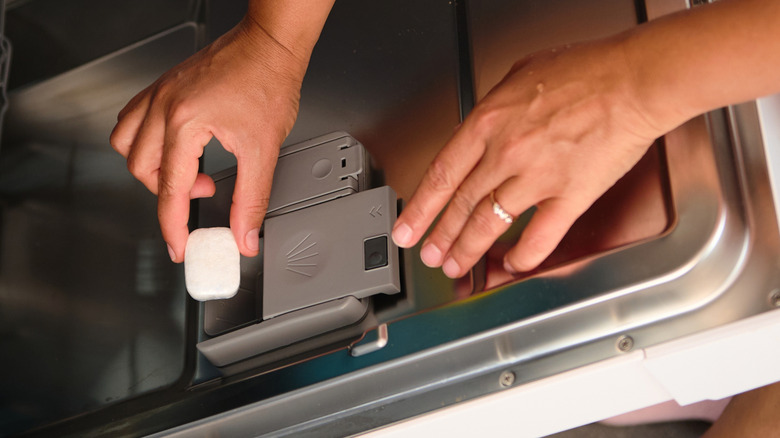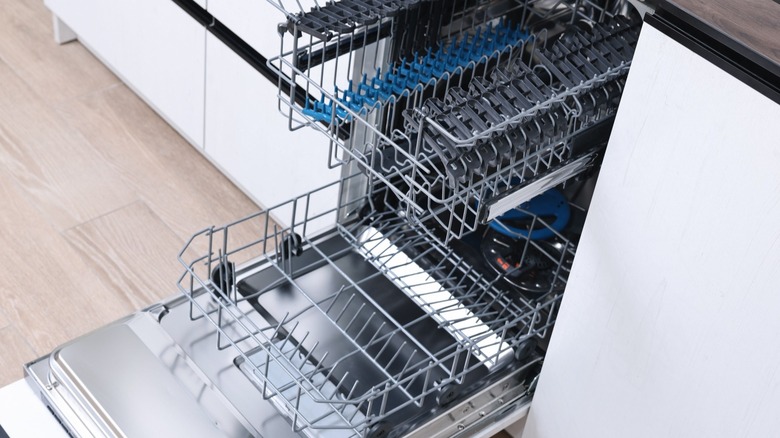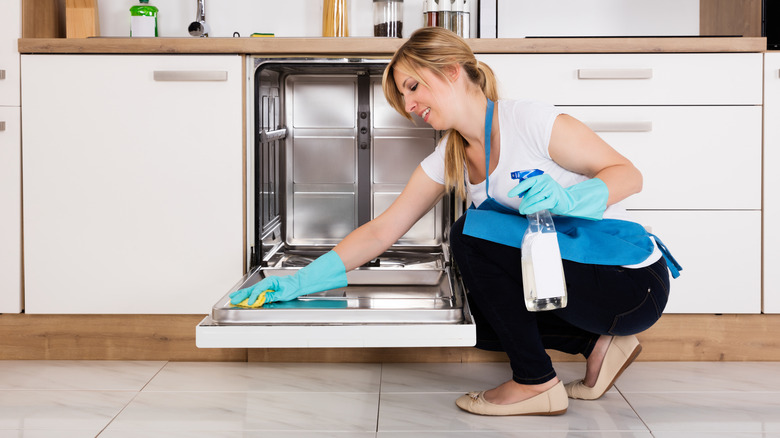Does Dishwasher Cleaner Really Work? Here's What You Need To Know
We may receive a commission on purchases made from links.
The MVP of household appliances is arguably the dishwasher. After all, it does the job that no one wants to volunteer for. Just like the most valuable players on a sports field, it needs regular maintenance for optimal performance. People do not always realize that their dishwasher needs special cleaning in the first place. Why should it when soap and hot water run through it every day?
You have to remember that all the gunk and junk you feed into this all-star appliance doesn't always leave the confined space. Eventually, this stuff builds up to the point that it works against the machine, preventing it from cleaning and sanitizing your dishes. Cleaning your machine at least once a month by running a cycle with a dishwasher cleaner, like Affresh or Finish does really work. In fact, adding this step is considered a proactive measure to keep the machine running as the manufacturer intended. Here's what you need to know about dishwasher cleaners.
How and why dishwasher cleaners work
Dishwasher cleaners work similarly to the detergent that washes your dishes. The difference is that the chemical combination of the dishwasher cleaner specifically targets breaking down the grime that builds up over time in the machine itself. This chemical combination works together to clean your dishwasher's tub, racks, pump, valve, and drain and recirculation hoses. By cutting out the buildup of minerals, limescale, grease, and detergent residue, the dishwasher cleaner improves water flow and proper drainage. This allows your dishwasher to effectively perform the most important task, thoroughly cleaning and sanitizing the dishes.
If you're looking for a DIY dishwasher cleaner, simply use citric acid. Cleaning with citric acid works because its corrosive properties function as a descaler. Notably, citric acid is a common ingredient in commercial cleaners. Put 3 to 4 tablespoons of food-grade citric acid in the detergent dispenser and run a cycle with an empty load. This works especially well if you have hard water.
The best practice when it comes to cleaning your dishwasher with any product, whether buying a commercial dishwasher cleaner or going the DIY route, is to consult your dishwasher's owner's manual from the manufacturer. It often provides directions on how to clean your specific dishwasher model, including product recommendations. In addition to using a dishwasher cleaner, there are other steps you can take to keep your kitchen MVP performing at its best.
The steps to proper dishwasher maintenance
To properly clean your dishwasher and keep it running like the star it is meant to be, you'll need to do some manual cleaning in addition to using a dishwasher cleaner. Wipe down the exterior, including the knobs, buttons, and switches, as part of your weekly kitchen cleaning regime. This keeps the outside looking nice and grime-free. For the inside, there are several ways to clean your dishwasher. The DIY of vinegar and baking soda is a tried-and-true method. Run a regular cycle with 2 cups of vinegar in a glass container sitting upright on the top rack. Let it air dry, then sprinkle 1 cup of baking soda on the bottom of the dishwasher and run a hot water cycle.
Check the inner workings for debris and clean them out if necessary. Pieces of food can get trapped under the spray arm and in the filter. Use a soft brush to clean these parts. This may need to be done anywhere from once a week to once every couple of months depending on how much debris ends up in your dishwasher. Dishwasher cleaners offer the opportunity to allow your machine dedicated time for care. Using them along with the above practices are sure to keep your dishwasher in tip-top shape.


